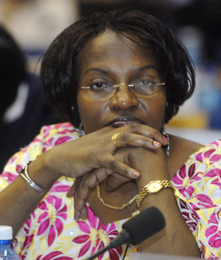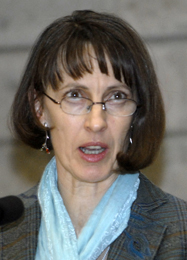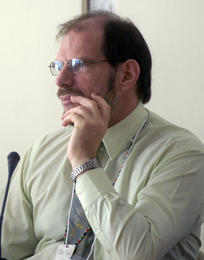|
JOIN THE IISD RS INITIATIVE |
Highlights from Tuesday, 6 February 2007
On Tuesday, GC-24/GMEF delegates convened in ministerial consultations and the Committee of the Whole (COW). Two contact groups on the budget and programme of work for 2008-2009, and on chemicals management also convened throughout the day.
|
| Ministerial Consultations: Panel discussion on responses to globalization and the environment |
UNIDO Director-General Kandeh Yumkella (left) highlighted supporting developing countries in meeting global environmental norms and standards through: capacity building; supporting coherence between ministries in different sectors; and technical and financial assistance for national implementation plans.
CBD Executive Secretary Ahmed Djoglaf (center) said a new phase of implementation engaging all stakeholders had been born at CBD COP-8, stressing “implementation, implementation, implementation.”
Olav Kjørven, UNDP, said that as a UN-wide cross-cutting value, sustainable development is the ideal starting point for discussing strengthening environmental governance. |
| Brazilian Environment Minister Marina Silva (left) noted that environmental efforts depend on technical investments, financial means, access to information, and ethical commitment. Achim Steiner, UNEP Executive Director (right), suggested focusing on opportunities rather than challenges. |
| Uganda (left) lamented that the economic returns of sustainability efforts such as biofuel production are insufficient incentives for their expansion. Khawla Al-Muhannadi, Environment Friends Society, Bahrain (right), emphasized the environmental impacts of war. |
| Ministerial Roundtables on Environment and Globalization |
James Leape, Director General WWF International, intervened during the round table discussion |
| Reports of the facilitators of the ministerial roundtable discussions |
|
|
| Swedish Environment Minister Andreas Carlgren, Imad Hassoun Homsi, Vice-Minister for the Environment, Syria, Laurent Sedogo, Environment Minister, Burkina Faso, Miklos Persany, Hungarian Environment Minister, and Connie Hedegaard, Danish Environment Minister |
|
| Governing Council President Roberto Dobles, UNEP Deputy Executive Director Shafqat Kakahel, and COW Chair Jan Dušik |
COW Chair Jan Dusik, Czech Republic
UNEP Deputy Executive Director Shafqat Kakakhel (center) introduced the agenda item on chemicals management, highlighting, inter alia: UNEP's cooperation with other MEAs on chemicals; SAICM; lead and cadmium; and UNEP's mercury programme.
IPCC Chair Rajendra K. Pachauri (right) presented key findings on the report “Climate Change 2007: the physical science basis.” He noted a significant increase in global atmospheric concentrations of carbon dioxide, methane and nitrous oxide as a result of human activities since 1750, stressing that the warming of the climate system is “unequivocal.” |
 |
|
| On chemicals management, Uganda, on behalf of the Africa Group (left), said that the binding commitment on mercury should include lead and cadmium, and, called for provision of new and additional resources for Africa. Dan Reifsnyder, US, said
stressed that it supported further action on mercury, including by expanding partnerships, which are more effective than legally binding mandates.
|
UN Office for Coordination of Humanitarian Affairs (OCHA) (left) noted joint UNEP-OCHA efforts on disaster and risk reduction, coordinated humanitarian response, and longer-term rehabilitation. Walter Erdelen, UNESCO identified areas for increased synergy between UNEP and UNESCO, including: scientific, technical and technological issues; disaster preparedness and mitigation; and capacity building. Paul, Dobie,
UNDP highlighted a recent proposal to a scale up the UNDP-UNEP Poverty Environment Initiative and an envisioned UNDP-UNEP Poverty Environment Facility to support mainstreaming of poverty environment issues in national development plans. |
| Panel Discussion on Globalization and the Environment |
Julia Marton-Lefèvre, Director-General, The World Conservation Union (IUCN) (left), stressed the need for the conservation community to understand globalization-environment linkages, in particular linkages between biodiversity loss and climate change beyond 2012.
José Diaz Duque, Cuban Minister of Science, Technology and Environment (center), reflected on environment and globalization from SIDS' perspective.
Sigmar Gabriel, German Environment Minister (right), emphasized raising awareness of security and economic implications of ecosystem destruction. He stressed the need to transform UNEP into a UNEO, noting it should advise WTO, IMF and UN Security Council on efficient use of resources without compromising development goals. |
 |
|
|
Jacqueline McGlade, European Environment Agency Executive Director (left), highlighted a “sea-change” in perceptions of environmental issues in the recent past.
The International Council for Local Environmental Initiatives Secretary General Konrad Otto-Zimmermann (center) noted that urban lifestyle increases the environmental burden, and described cities' initiatives on climate change and “environmental budgeting.”
Guy Ryder, International Trade Union Confederation (right), called for creation of “green” economies and jobs. He underscored UNEP's role in encouraging political leaders to take immediate environmental action knowing that payoffs will occur long after their term of office expires. |
| Contact Group: Budget and Programme of Work |
| Contact Group Chair Jan Bauer, Netherlands, opened discussions on the proposed budget and programme of work for 2008-2009 (UNEP/GC/24/9). |
 |
Special Event: UNEP-UNDP Cooperation and launch of the joint Poverty and Environment Facility |
| Kemal Dervis, UNDP Administrator, and UNEP Executive Director Achim Steiner |
| Special Event: Launching of the IPCC report: Climate Change 2007- the Physical Science Basis |
| Achim Steiner, UNEP Executive Director, GC President Ricardo Dobles, Rajendra Pachauri Chairman of the IPCC, and Bubu Jallow, IPCC Working Group 1 Vice-Chair, the Gambia |
| Press Conference: The Last Stand of the Orangutan: State of Emergency--Illegal logging, Fire and Palm Oil in Indonesia's National Parks |
| Walter Erdelen, UNESCO, Achim Steiner, UNEP Executive Director, Rachmat Witoelar, Indonesian Environment Minister, and Christian Nelleman, UNEP-GRID Arendal |
| Rachmat Witoelar, Indonesian Environment Minister, and Achim Steiner |
| Achim Steiner and Peter Bridgewater, Ramsar Convention, sign letters of agreement between UNEP and Ramsar on great ape conservation in wetlands.
|
|